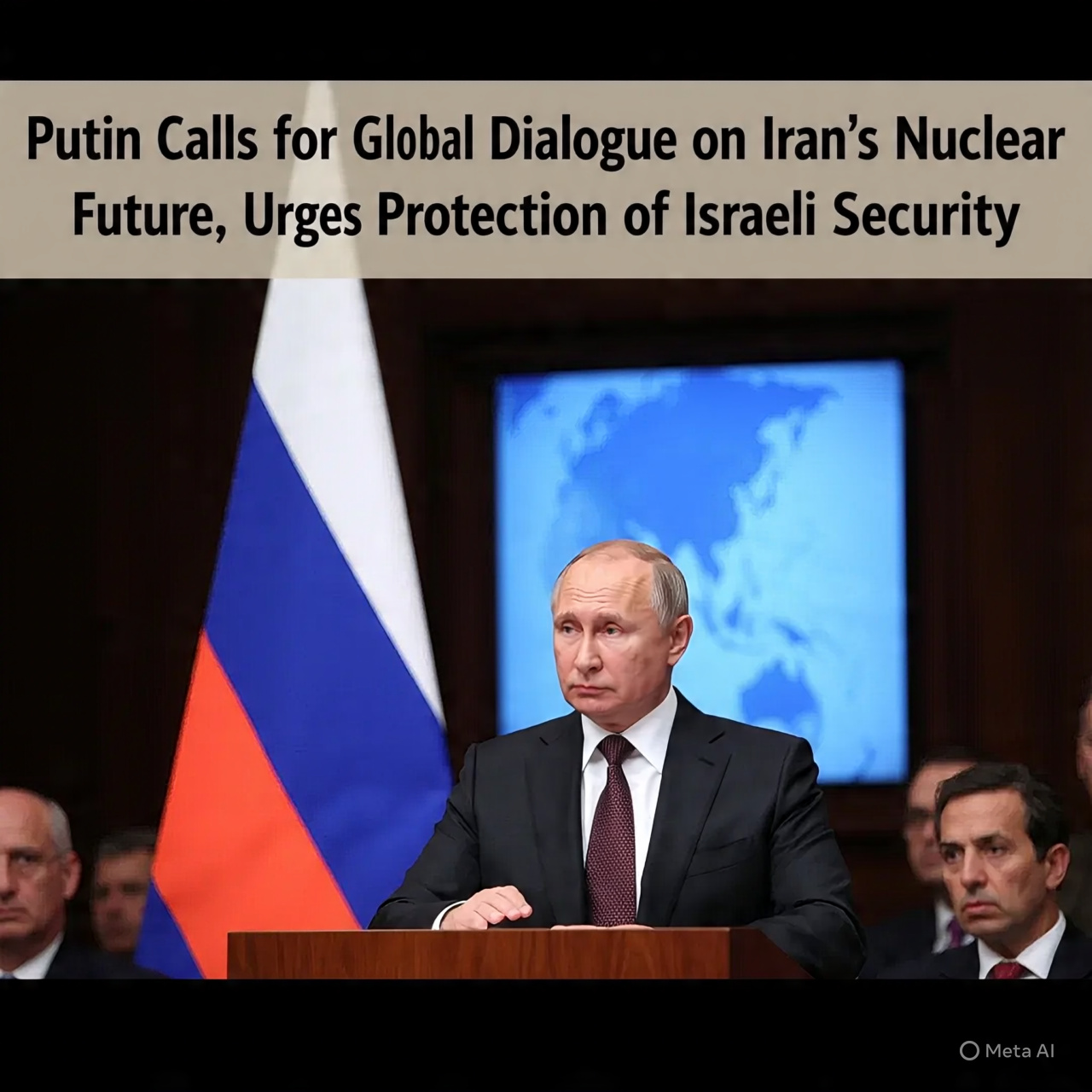FnF News
🌍 FNF News | Geopolitics & Diplomacy
Published: June 19, 2025
By: Khadija Khan, International Affairs Editor
Putin Calls for Global Dialogue on Iran’s Nuclear Program, Urges Protection of Israeli Security
Moscow, Russia — As the Iran-Israel conflict threatens to spill beyond regional borders, Russian President Vladimir Putin has issued a rare public appeal for international dialogue and cooperation, urging all involved parties to return to the table to resolve tensions surrounding Iran’s nuclear ambitions while simultaneously ensuring the security of the Israeli state.
“It would only be right for all parties to come together to dialogue and ensure cooperation with Iran as it pursues peaceful nuclear capabilities; meanwhile assure safety for the Israeli state,” said Putin during a televised address following a security council briefing in the Kremlin.
Putin’s remarks come at a crucial moment of global unease, as Iran escalates enrichment activities while Israel, backed by Western allies, ramps up its regional defense operations. The Russian leader’s call signals a calculated shift in tone—positioning the Kremlin as a potential broker amid a volatile situation where U.S. leadership is perceived by some as waning.
A Balancing Act Between Tehran and Tel Aviv
Russia has long walked a diplomatic tightrope between Iran and Israel.
Moscow and Tehran share military and economic ties, particularly through their cooperation in Syria and energy sectors. Iran has been a key ally for Russia in circumventing Western sanctions, with oil and arms deals expanding since 2022.
At the same time, Russia has maintained deconfliction mechanisms with Israel in Syria and has publicly acknowledged Israel’s right to defend itself against existential threats—especially from Iran-backed proxy groups like Hezbollah.
“Putin is attempting to thread a geopolitical needle,” said Dr. Alina Polyakova, CEO of the Center for European Policy Analysis. “He wants to retain leverage with Iran without completely alienating Israel or sparking a regional war that could disrupt Russian interests in the Middle East.”
Iran’s Nuclear Timeline: Peaceful or Provocative?
The backdrop to Putin’s statement is a dramatic acceleration of Iran’s nuclear activity. According to a June 2025 IAEA report, Iran has now amassed uranium enriched to 84%, just short of weapons-grade levels. While Tehran insists its program is for “peaceful energy development,” Western intelligence agencies are warning of imminent breakout potential.
The U.S., France, and the U.K. have all issued stern warnings to Tehran, with some reports suggesting that Israeli cyber units may have already launched preliminary operations against Iran’s nuclear infrastructure.
Putin’s proposal seeks to revive a modified version of the JCPOA, the 2015 nuclear deal abandoned by the Trump administration in 2018. He suggested that Russia, China, and key EU states act as guarantors for a framework allowing Iran access to civilian nuclear energy while maintaining intrusive inspections to prevent weapons development.
“Russia is committed to nonproliferation,” Putin said. “But this must be pursued without unilateral coercion or threats of military aggression.”
A Security Umbrella for Israel?
Putin’s inclusion of Israeli security in his remarks was notable, especially given Russia’s support for some of Israel’s adversaries in the region.
“No one in the international community should question Israel’s right to exist in peace and security,” Putin added. “We must separate the actions of governments from the safety of civilians.”
Analysts interpret this as a message to Tehran as much as to the West. Israel has faced a wave of Hezbollah rocket fire from Lebanon and intensified cyber attacks reportedly linked to Iranian IRGC units.
Netanyahu’s government has not responded directly to Putin’s comments but has made clear that any direct Iranian threat will be met with overwhelming force.
Trump and Putin: Unofficial Channels Active
Putin’s renewed focus on diplomacy comes just days after he confirmed he is in contact with former U.S. President Donald Trump, as well as Israeli Prime Minister Benjamin Netanyahu. Trump has yet to comment publicly but is expected to unveil a “Middle East Peace Strategy 2.0” at the upcoming America First Policy Summit.
Some observers believe Putin is trying to carve a diplomatic lane ahead of both Biden and Trump to reassert Russia’s global role after years of isolation over the Ukraine conflict.
“Putin knows the Middle East is in flux, and he’s using every tool to stay relevant,” said Dmitri Trenin, a former Russian military officer and strategic analyst. “By speaking the language of peace, he projects stability without changing his core posture.”
Western Skepticism
The U.S. State Department issued a cautious statement following Putin’s remarks, noting that “Russia’s history of enabling Iran’s nuclear advances raises questions about the sincerity of its call for peaceful development.”
European allies were similarly wary, especially as Russia continues to partner with Iran on drone and missile production believed to support operations in Ukraine and Syria.
Still, some in the diplomatic community expressed hope that Putin’s words could reduce short-term risks, if not fully resolve the crisis.
Conclusion: An Unlikely Peacemaker or Strategic Gambit?
Putin’s sudden bid for a mediating role in the Iran-Israel crisis reflects a shifting geopolitical chessboard. With the U.S. engaged in multiple global arenas, and Europe preoccupied with domestic crises, Russia may be exploiting the vacuum of leadership—even while fanning the flames behind the curtain.
Whether this is a genuine push for peace or a clever bid for leverage, one thing is clear: the future of the Middle East may be decided in conversations not led by Washington—but by Moscow, Jerusalem, and Tehran.

